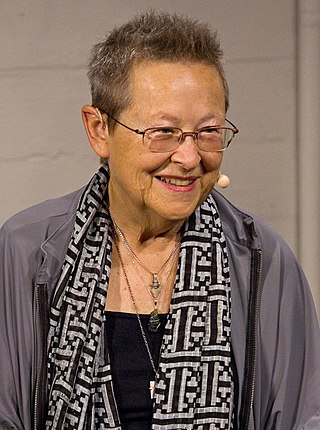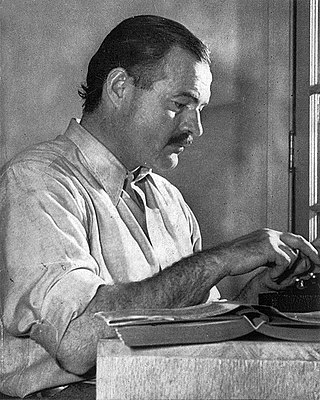Related Research Articles

The Acts of the Apostles is the fifth book of the New Testament; it tells of the founding of the Christian Church and the spread of its message to the Roman Empire.
The ellipsis..., a.k.a. suspension point, suspension, points of ellipsis, periods of ellipsis, or colloquially dot-dot-dot, is a punctuation mark consisting of a series of three dots. An ellipsis can be used many ways including for intentional omission of text or to imply a concept without using words.
In English-language punctuation, the serial comma, also referred to as the series comma, Oxford comma, or Harvard comma, is a comma placed immediately after the penultimate term and before the coordinating conjunction in a series of three or more terms. For instance, a list of three countries might be punctuated without the serial comma as "France, Italy and Spain" or with the serial comma as "France, Italy, and Spain". The serial comma can serve to avoid ambiguity in specific contexts, though its employment may also generate ambiguity under certain circumstances.

Lives of the Most Eminent English Poets (1779–81), alternatively known by the shorter title Lives of the Poets, is a work by Samuel Johnson comprising short biographies and critical appraisals of 52 poets, most of whom lived during the eighteenth century. These were arranged, approximately, by date of death.

The pastoral epistles are a group of three books of the canonical New Testament: the First Epistle to Timothy, the Second Epistle to Timothy, and the Epistle to Titus. They are presented as letters from Paul the Apostle to Timothy and to Titus. However, many scholars believe they were written after Paul's death. They are generally discussed as a group and are given the title pastoral because they are addressed to individuals with pastoral oversight of churches and discuss issues of Christian living, doctrine and leadership. The term "pastorals" was popularized in 1703 by D. N. Berdot and in 1726 by Paul Anton. Alternate nomenclature for the cluster of three letters has been proposed: "Corpus Pastorale," meant to highlight the intentional forgery of the letters as a three-part corpus, and "Letters to Timothy and Titus," meant to emphasize the individuality of the letters.

Autoethnography is a form of ethnographic research in which a researcher connects personal experiences to wider cultural, political, and social meanings and understandings. It is considered a form of qualitative and/or arts-based research.

Adrienne Mayor is a historian of ancient science and a classical folklorist.

Pauline Betz Addie was an American professional tennis player. She won five Grand Slam singles titles and was the runner-up on three other occasions. Jack Kramer called her the second best female tennis player he ever saw, behind Helen Wills Moody.
There are a number of passages in the Hebrew Bible and the New Testament that have been interpreted as involving same-sex sexual activity and relationships. The passages about homosexual individuals and sexual relations in the Hebrew Bible are found primarily in the Torah. The book of Leviticus chapter 20 is more comprehensive on matters of detestable sexual acts. Some texts included in the New Testament also reference homosexual individuals and sexual relations, such as the Gospel of Matthew, the Gospel of Luke, and Pauline epistles originally directed to the early Christian churches in Asia Minor. Both references in the Hebrew Bible and the New Testament have been interpreted as referring primarily to male homosexual individuals and sexual practices. though the term homosexual was never used as it was not coined until the 19th century.

The iceberg theory or theory of omission is a writing technique coined by American writer Ernest Hemingway. As a young journalist, Hemingway had to focus his newspaper reports on immediate events, with very little context or interpretation. When he became a writer of short stories, he retained this minimalistic style, focusing on surface elements without explicitly discussing underlying themes. Hemingway believed the deeper meaning of a story should not be evident on the surface, but should shine through implicitly.

A biography, or simply bio, is a detailed description of a person's life. It involves more than just basic facts like education, work, relationships, and death; it portrays a person's experience of these life events. Unlike a profile or curriculum vitae (résumé), a biography presents a subject's life story, highlighting various aspects of their life, including intimate details of experience, and may include an analysis of the subject's personality.
Daniel J. Harrington, S.J., was an American academic and Jesuit priest who served as professor of New Testament and chair of the Biblical Studies department at Boston College School of Theology and Ministry.
Victimisation is the state or process of being victimised or becoming a victim. The field that studies the process, rates, incidence, effects, and prevalence of victimisation is called victimology.
Zero-marking in English is the indication of a particular grammatical function by the absence of any morpheme. The most common types of zero-marking in English involve zero articles, zero relative pronouns, and zero subordinating conjunctions. Examples are I like cats in which the absence of the definite article, the, signals cats to be an indefinite reference, whose specific identity is not known to the listener; that's the cat I saw in which the relative clause (that) I saw omits the implied relative pronoun, that, which would otherwise be the object of the clause's verb; and I wish you were here. in which the dependent clause, (that) you were here, omits the subordinating conjunction, that.

The Letters of J. R. R. Tolkien is a selection of the philologist and fantasy author J. R. R. Tolkien's letters. It was published in 1981, edited by Tolkien's biographer Humphrey Carpenter, who was assisted by Christopher Tolkien. The selection, from a large mass of materials, contains 354 letters. These were written between October 1914, when Tolkien was an undergraduate at Oxford, and 29 August 1973, four days before his death. The letters are of interest both for what they show of Tolkien's life and for his interpretations of his Middle-earth writings.
Alison Donnell is an academic, originally from the United Kingdom. She is Professor of Modern Literatures and Head of the School of Literature, Drama and Creative Writing at the University of East Anglia. She was previously Head of School of Literature and Languages at the University of Reading, where she also founded the research theme "Minority Identities: Rights and Representations". Her primary research field is anglophone postcolonial literature, and she has been published widely on Caribbean and Black British literature. Much of her academic work also focuses questions relating to gender and sexual identities and the intersections between feminism and postcolonialism.

In typography, a dinkus is a typographic symbol which often consists of three spaced asterisks in a horizontal row, i.e. ∗ ∗ ∗ . The symbol has a variety of uses, and it usually denotes an intentional omission or a logical "break" of varying degree in a written work. This latter use is similar to a subsection, and it indicates to the reader that the subsequent text should be re-contextualized. When used this way, the dinkus typically appears centrally aligned on a line of its own with vertical spacing before and after the symbol. The dinkus has been in use in various forms since c. 1850. Historically, the dinkus was often represented as an asterism, ⁂, though this use has fallen out of favor and is now nearly obsolete.
The Traffic in Women: Notes on the "Political Economy" of Sex is an article regarding theories of the oppression of women originally published in 1975 by feminist anthropologist Gayle Rubin. In the article, Rubin argued against the Marxist conceptions of women's oppression—specifically the concept of "patriarchy"—in favor of her own concept of the "sex/gender" system. It was by arguing that women's oppression could not be explained by capitalism alone as well as being an early article to stress the distinction between biological sex and gender that Rubin's work helped to develop women's and gender studies as independent fields. The framework of the article was also important in that it opened up the possibility of researching the change in meaning of this categories over historical time. Rubin used a combination of kinship theories from Lévi-Strauss, psycho-analytic theory from Freud, and critiques of structuralism by Lacan to make her case that it was at moments where women were exchanged that bodies were engendered and became women. Rubin's article has been republished numerous times since its debut in 1975, and it has remained a key piece of feminist anthropological theory and a foundational work in gender studies.

Rape, among other acts of wartime sexual violence, was frequently committed against female Vietnamese civilians during the Vietnam War. It was an aspect of the various human rights abuses perpetrated by the United States and South Korea, as well as by local Vietnamese combatants. According to American political scientist Elisabeth Jean Wood, the sexual violation of women by American military personnel was tolerated by their commanders. American professor Gina Marie Weaver stated that not only were documented crimes against Vietnamese women by American soldiers ignored during the international legal discourse that occurred immediately after the conflict, but modern feminists and other anti-war rape campaigners, as well as historians, have continued to dismiss them.
References
- ↑ "purposeful omission". Webster's Online Dictionary. Retrieved 2012-04-02.[ dead link ]
- ↑ Peter Rollins; John E. O'Connor (25 July 2008). Why We Fought: America's Wars in Film and History . University Press of Kentucky. p. 556. ISBN 978-0-8131-7297-2 . Retrieved 2 April 2012.
- ↑ Alison Donnell; Pauline Polkey (2000). Representing lives: women and auto/biography. Palgrave Macmillan. p. 70. ISBN 978-0-312-22667-1 . Retrieved 2 April 2012.
- ↑ Kevin F. O'Malley; Jay E. Grenig; William C. Lee; Edward James Devitt; West Group (1999). Federal jury practice and instructions. West Group. p. 628. Retrieved 2 April 2012.
- ↑ Paul G. Spirakis; Marios Mavronicolas; Spyros Kontogiannis (2006). Internet and network economics: second international workshop, WINE 2006, Patras, Greece, December 15-17, 2006 : proceedings. Springer. p. 370. ISBN 978-3-540-68138-0 . Retrieved 2 April 2012.